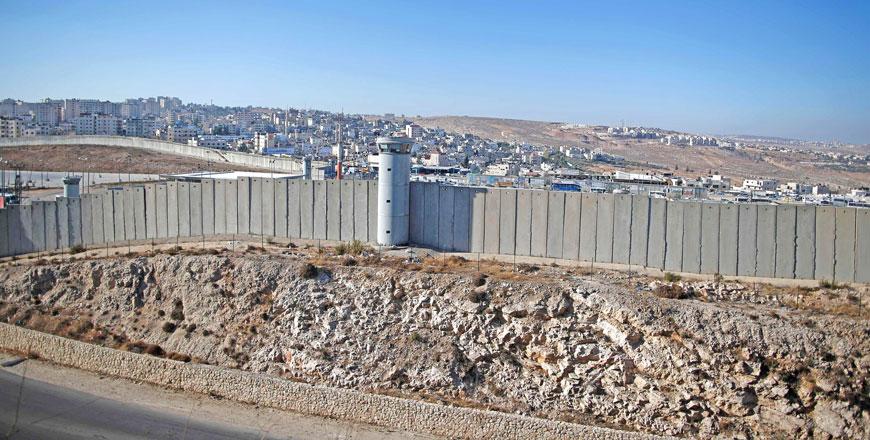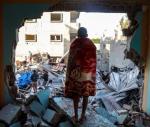You are here
UN’s Ban warns of ‘provocations’, calls for talks
By AFP - Oct 13,2014 - Last updated at Oct 13,2014

OCCUPIED JERUSALEM — UN chief Ban Ki-moon warned Monday against "provocations" as clashes erupted at Jerusalem's holy sites, condemning Israeli settlement activity and calling for peace talks with the Palestinians.
Ban was speaking in Ramallah and Jerusalem where he met with Palestinian and Israeli leaders, a day after a donor conference for Gaza and hours after clashes at Al Aqsa Mosque compound between Israeli police and Palestinians.
"I am also deeply concerned by repeated provocations at the holy sites in Jerusalem. These only inflame tensions and must stop," Ban said at a joint news conference with Palestinian Prime Minister Rami Hamdallah in Ramallah on the West Bank.
Palestinian protesters demonstrated against Orthodox Jews going to the esplanade, which is holy to both Islam and Judaism, with Israeli forces eventually arresting four and enabling Jews to visit the site.
Israeli Prime Minister Benjamin Netanyahu said Palestinian extremists were to blame for the clashes, the second such violent outburst in less than a week.
"Israel is committed to maintaining the status quo exactly as it's been for many decades. What we're seeing is Palestinian extremists who are instigating violence through incitement," he said in Ban's presence at his Jerusalem office.
The UN chief's visit came a day after a Cairo conference at which international donors pledged $5.4 billion (4.3 billion euros) to rebuild the war-ravaged Gaza Strip.
The amount raised by the international community for Gaza was "encouraging", Ban said in Ramallah, noting the funds would go towards the "urgently needed" reconstruction of infrastructure and homes.
Nearly 2,200 Palestinians, mainly civilians, were killed in the 50-day war in July and August, with 73 people killed on the Israeli side, mostly soldiers.
‘Roots of instability’
But “while rebuilding is important, we must tackle the root causes of instability”, Ban reiterated.
At the donor conference, Ban said “the root causes of the recent hostilities” were “a restrictive occupation that has lasted almost half a century, the continued denial of Palestinian rights and the lack of tangible progress in peace negotiations”.
Netanyahu, however, maintained the occupation was not relevant to the Gaza conflict.
“The root cause of the violence that burst from Gaza is not Israel’s occupation in Gaza, for a simple reason: Israel doesn’t occupy Gaza,” he told the UN chief.
“The root cause of this summer’s outburst of violence was Hamas’ rocketing of Israeli cities,” he said, referring to the Islamist movement which rules Gaza.
Netanyahu also urged Ban to prevent the Palestinians from taking unilateral diplomatic measures at the United Nations.
“A real peace can only be achieved through bilateral negotiations,” Netanyahu told Ban ahead of a meeting with him.
“I believe that unilateral steps by Palestinians at the United Nations will not advance peace,” he said. “If the UN wants to support a genuine reconciliation, it must avoid any steps that could undermine peace.”
Ban took Netanyahu to task for Israel’s own unilateral settlement construction announcements, saying they were “in clear violation of international law” and do “not send the right signals”.
“I urge the government of Israel to reverse these activities,” he said.
The White House and European Union have slammed Israel’s approval in September for 2,600 new settlement units to be built in Israeli-annexed Arab East Jerusalem.
The UN chief called on the sides to “quickly return to the negotiation table with the readiness to make the tough but necessary compromises”.
“Unilateral action is no foundation for the future,” Ban said.
“The two-state solution is the only way to bring peace to both sides,” he said, urging the sides to swiftly revive a stagnant peace process that collapsed in April despite intense US efforts.
Gaza’s war displaced more than a quarter of its population of 1.7 million and left 100,000 people homeless.
The $5.4 billion in aid pledged in Cairo on Sunday includes $1 billion from Qatar, $212 million from the US and 450 million euros from the EU, and will be overseen jointly by the UN and the West Bank-based Palestinian Authority.
Rivals Hamas and Fateh, which dominates the PA, signed a unity deal in April under which a consensus government was sworn in.
Related Articles
OCCUPIED JERUSALEM — US top diplomat Antony Blinken on Tuesday vowed support to help rebuild the battered Gaza Strip and shore up a truce be
WASHINGTON — The United States is deeply concerned about Israel's reported plans to build an additional 323 units in settlements in East Jer
OCCUPIED JERUSALEM — The Islamist movement Hamas has warned of "repercussions" over plans by Israel's president to visit a disputed holy sit



















